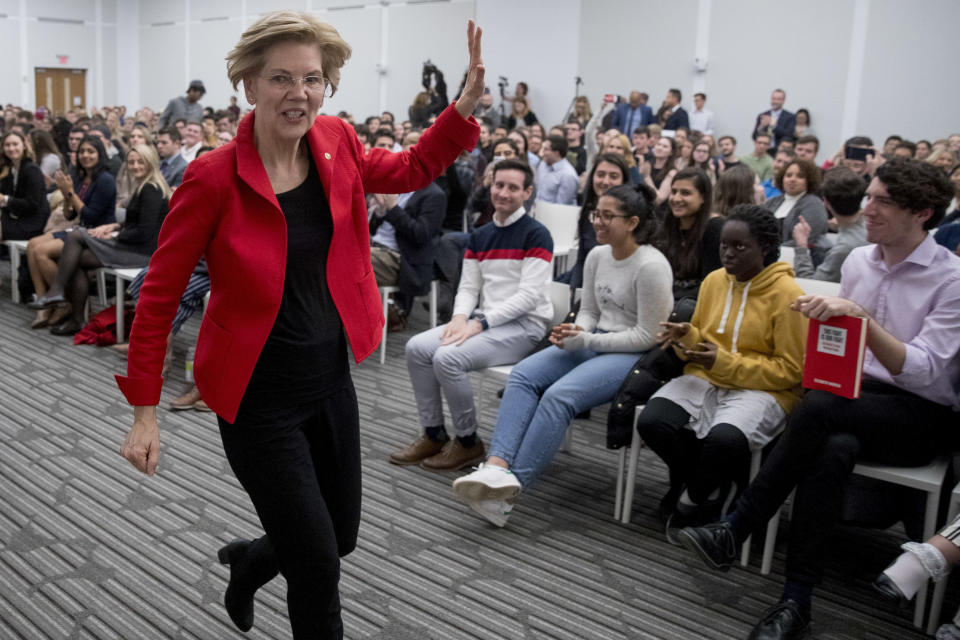Warren turns up rhetoric against Wall Street in 2020 bid
Elizabeth Warren has kicked off her bid to become the next president of the United States, and the “sheriff of Wall Street” is pushing hard on a campaign message focused on criticizing corporate America.
The Massachusetts Senator announced Monday she would be launching an exploratory committee for president, promising to fight “corruption” among Washington politicians eager to cut regulations and taxes for large companies.
“Politicians look the other way while big insurance companies deny patients life-saving coverage, while big banks rip off consumers, and while big oil companies destroy this planet,” Warren said in a four-and-a-half-minute video. “Our government’s supposed to work for all of us but instead it has become a tool for the wealthy and well-connected.”
If Warren ends up jockeying for the Democratic nomination in the 2020 election, she will likely bank on an anti-Wall Street message in the same tenor as the regulatory policies she’s pursued as a Senator.
Watchdog
Warren rose to fame as a college professor, not a politician. As a Harvard law professor focused on bankruptcy, Warren answered Capitol Hill’s call to advise policy during the 2008 financial crisis. In Washington, Warren served on the Congressional Oversight Panel over the Troubled Asset Relief Program and helped engineer the creation of the Consumer Financial Protection Bureau.
Warren became a household name as Congress installed new guardrails on the banking and finance industry through the Dodd-Frank Wall Street Reform and Consumer Protection Act.
“Failures of our regulatory system were an important contributor to the country’s worst financial disaster since the Great Depression,” Warren said in 2011.
The CFPB was central to Warren’s mission of keeping a close eye on the finance industry. The independent “watchdog” agency, headed by a single director appointed by the president, would be committed to policing financial products to make sure they comply with consumer protection laws.

In 2010, TIME Magazine featured Warren as one of the “New Sheriffs of Wall Street,” alongside Securities and Exchange Commission Chair Mary Schapiro and Federal Deposit Insurance Corp. Chair Sheila Bair.
But both the CFPB and TARP were controversial. Critics claimed the CFPB’s structure gave too much — perhaps unconstitutional — power to a single director and bashed TARP as a government bailout that invited moral hazard into the c-suites of America’s largest, most systemic companies.
Still, Warren ended up on the ticket for Massachusetts Senate in 2012, beating incumbent Republican Scott Brown in a tight race where Warren ended up with just over 53% of the vote.
On Capitol Hill
Although a junior Senator, Warren quickly elevated herself to one of the more visible Democrats on Capitol Hill, championing progressive stances on non-finance issues like abortion and gay rights.
But Warren continued to make banking and finance one of her main priorities. In the last two years, Warren has used her seat on the Senate Banking Committee to press hard on Equifax (EFX) in the wake of its data breach and on Navient (NAVI) for allegations of student loan malfeasance.
Her most high-profile public spat is still against Wells Fargo (WFC), the bank that admitted to falsifying millions of accounts without customers’ permissions. In the wake of the scandal, Warren called on regulators to punish Wells Fargo for violating consumer protection law — which the Federal Reserve ultimately did in February by imposing an unprecedented asset cap on the company.
In a tweet thread on Monday, Warren even referenced former Wells Fargo CEO John Stumpf as an example of politicians “run[ning] our government for the rich and powerful instead of holding them accountable.”
Warren has also taken on other politicians, most notably criticizing Republican Rep. Mick Mulvaney, when Trump appointed him to head the very agency that Warren created: the CFPB. While Mulvaney worked to undo the “Elizabeth Warren view of the world that lending money for profit is evil,” Warren fired back and accused Mulvaney of easing oversight over predatory lenders.
On policy, Warren has made it clear that she thinks the finance industry needs more policing. She has proposed new rules that would bar elected officials and senior agency officials from owning or trading stocks while in office, opposed legislation that dialed back some Dodd-Frank rules on small- to medium- sized banks, and danced at the idea of reviving the Glass-Steagall law separating commercial and investment banking.
Having won her 2018 bid for Senate re-election in Massachusetts, Warren now turns to 2020 for possibly higher ambitions.
Warren said in her video that she is worried about the impact of “billionaires and big corporations” on the nation’s middle class, a message she’ll likely double down on as she enters a crowded race for the Democratic primary.
Brian Cheung is a reporter covering the banking industry and the intersection of finance and policy for Yahoo Finance. You can follow him on Twitter @bcheungz.
Read more:
Leveraged loans aren't as attractive as they used to be
Banks wave off Mnuchin's concerns over liquidity
House Republican to regulators: Ease Volcker rule on large banks
NY Fed's Williams hints at flexibility with balance sheet unwind
Congress may have accidentally freed nearly all banks from the Volcker Rule
